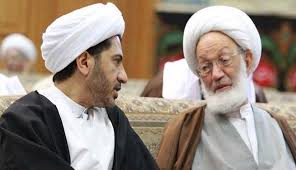
Bahrain’s leading cleric, Sheikh Issa al-Qassem denounced the trial of the Secretary General of al-Wefaq opposition group, Sheikh Ali Salman by Al Khalifa regime, stressing that the accusations against Sheikh Salman are void.
In a statement released late on Wednesday, Sheikh Qassem said that delaying the trial of Sheikh Salman is “politically motivated,” stressing that it aims at extending the duration of his “unjust detention.”Sheikh Issa Qassem and Sheikh Ali Salman
“The charges against Sheikh Salman are baseless, according to the majority of the people (in Bahrain), rights groups, scholars, international organizations and several states, including those who are considered the regime’s allies.”
Meanwhile, the leading cleric warned that the detention of Sheikh Salman doesn’t serve the national interest as it raises the tensions in the country.
The detention of Sheikh Salman as well as many other political figures is obvious intention by the regime to go on with its oppression against the people, Sheikh Qassem said.
His eminence stressed, however, that oppression will never break the will of Sheikh Salman as well as that of the Bahraini people.
“Our people love their country, its seucrity, welfare, stability and indepence. Our people are sticking to their demands and are patient,” Sheikh Qassem concluded his statement by saying.







